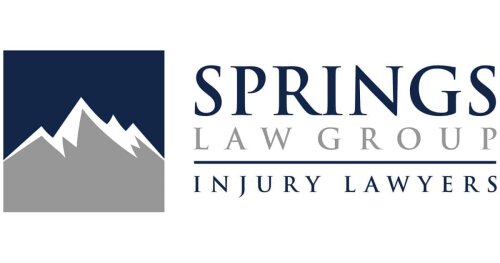
Best Property Insurance Lawyers in Colorado
Share your needs with us, get contacted by law firms.
Free. Takes 2 min.
Or refine your search by selecting a city:
List of the best lawyers in Colorado, United States

About Property Insurance Law in Colorado, United States
Property insurance is designed to protect homeowners and business owners in Colorado against financial losses due to damage, theft, or loss of property. Policies generally cover risks such as fire, theft, windstorm, hail, and water damage. Insurance carriers operate under both state and federal regulations to ensure reliable coverage, fair claims handling, and transparent policy terms. The unique climate in Colorado, including the potential for wildfires, hail storms, and heavy snowfall, makes property insurance particularly important for residents and property owners in the state.
Why You May Need a Lawyer
People in Colorado may need legal help with property insurance in several situations. Common issues include denied or underpaid claims, confusing policy language, delayed payments, and disputes over coverage exclusions. Legal assistance can be invaluable when dealing with dishonest insurance practices, total losses after natural disasters, or complicated damage assessments. Lawyers can review your policy, represent your interests in negotiations with insurers, handle litigation if necessary, and help ensure you receive the benefits you are entitled to under your policy.
Local Laws Overview
Colorado property insurance is governed by several important state laws and insurance regulations. The Colorado Division of Insurance oversees the conduct of insurance companies, ensuring compliance with state standards. Colorado law requires insurance companies to act in good faith and handle claims promptly. The state has adopted specific statutes regarding unfair claims settlement practices, includes timeframes for responding to claims, and provides for the right to challenge claim denials. Additionally, property owners in certain areas may need to meet specific requirements for wildfire mitigation to maintain coverage. Understanding these legal frameworks can help policyholders protect their rights during the claims process.
Frequently Asked Questions
What types of property insurance are commonly offered in Colorado?
Most insurers in Colorado offer homeowners, renters, condo, and commercial property insurance. These policies typically cover risks such as fire, theft, wind, hail, and in some cases, water damage.
Does property insurance in Colorado cover damage from wildfires or hailstorms?
Yes, most standard property insurance policies in Colorado cover wildfire and hailstorm damage, but it is important to review your policy to confirm coverage and any special exclusions or requirements.
What should I do if my property insurance claim is denied?
You should review the denial letter, gather supporting documents, and consider contacting a property insurance lawyer. The Colorado Division of Insurance also provides resources for filing complaints.
How long does my insurance company have to process my claim?
Colorado law requires insurance companies to acknowledge your claim within a specific timeframe, usually 15 days, and make a decision within a reasonable period, often 60 days after receiving a proof of loss.
Can my insurance company cancel my policy after I file a claim?
Insurance companies can cancel policies under certain circumstances, but Colorado law restricts cancellations to valid reasons such as non-payment or significant risk changes, not simply for filing a legitimate claim.
What is considered bad faith by an insurance company?
Bad faith includes unfair denial of valid claims, unreasonable delays, misrepresenting policy terms, or failing to properly investigate a claim. Policyholders have legal rights to pursue action against bad faith practices.
What steps should I take after property damage occurs?
Document the damage with photos and video, contact your insurer to start a claim, secure your property to prevent further damage, and keep records of all interactions with your insurance company.
Are there special considerations for mountain properties?
Yes, properties in mountainous regions face higher risks like wildfires and landslides. Insurance companies may require specific mitigation measures and coverage costs may be higher in these areas.
Is flood damage typically covered by property insurance in Colorado?
No, standard property insurance policies in Colorado usually exclude flood damage. You need separate flood insurance, which is often available through the National Flood Insurance Program.
What can I do if I cannot reach an agreement with my insurer?
You may consider hiring a property insurance attorney to negotiate with your insurer or pursue legal remedies. You can also file a complaint with the Colorado Division of Insurance.
Additional Resources
Several organizations and governmental bodies provide assistance to those dealing with property insurance issues in Colorado:
- Colorado Division of Insurance - Regulates insurance companies and helps resolve complaints from consumers
- Colorado Bar Association - Provides lawyer referral services and legal resources for consumers
- National Association of Insurance Commissioners - Offers consumer guides and state-specific insurance information
- United Policyholders - A nonprofit that provides valuable guides on policyholder rights and disaster recovery
Next Steps
If you are facing a property insurance dispute or have questions about your coverage, start by gathering all policy documents and correspondence with your insurer. Assess the situation to determine if you can resolve it directly with your insurance company. If your claim is denied, delayed, or you are offered less than you believe you are owed, consider consulting with a property insurance attorney in Colorado. Lawyers can often provide free initial consultations and help you understand your legal rights. Additionally, you can reach out to the Colorado Division of Insurance for guidance or file a formal complaint if you believe your insurance company acted improperly.
Acting quickly and getting professional advice will help protect your property interests and financial security.
Lawzana helps you find the best lawyers and law firms in Colorado through a curated and pre-screened list of qualified legal professionals. Our platform offers rankings and detailed profiles of attorneys and law firms, allowing you to compare based on practice areas, including Property Insurance, experience, and client feedback.
Each profile includes a description of the firm's areas of practice, client reviews, team members and partners, year of establishment, spoken languages, office locations, contact information, social media presence, and any published articles or resources. Most firms on our platform speak English and are experienced in both local and international legal matters.
Get a quote from top-rated law firms in Colorado, United States — quickly, securely, and without unnecessary hassle.
Disclaimer:
The information provided on this page is for general informational purposes only and does not constitute legal advice. While we strive to ensure the accuracy and relevance of the content, legal information may change over time, and interpretations of the law can vary. You should always consult with a qualified legal professional for advice specific to your situation.
We disclaim all liability for actions taken or not taken based on the content of this page. If you believe any information is incorrect or outdated, please contact us, and we will review and update it where appropriate.
Browse property insurance law firms by city in Colorado
Refine your search by selecting a city.








